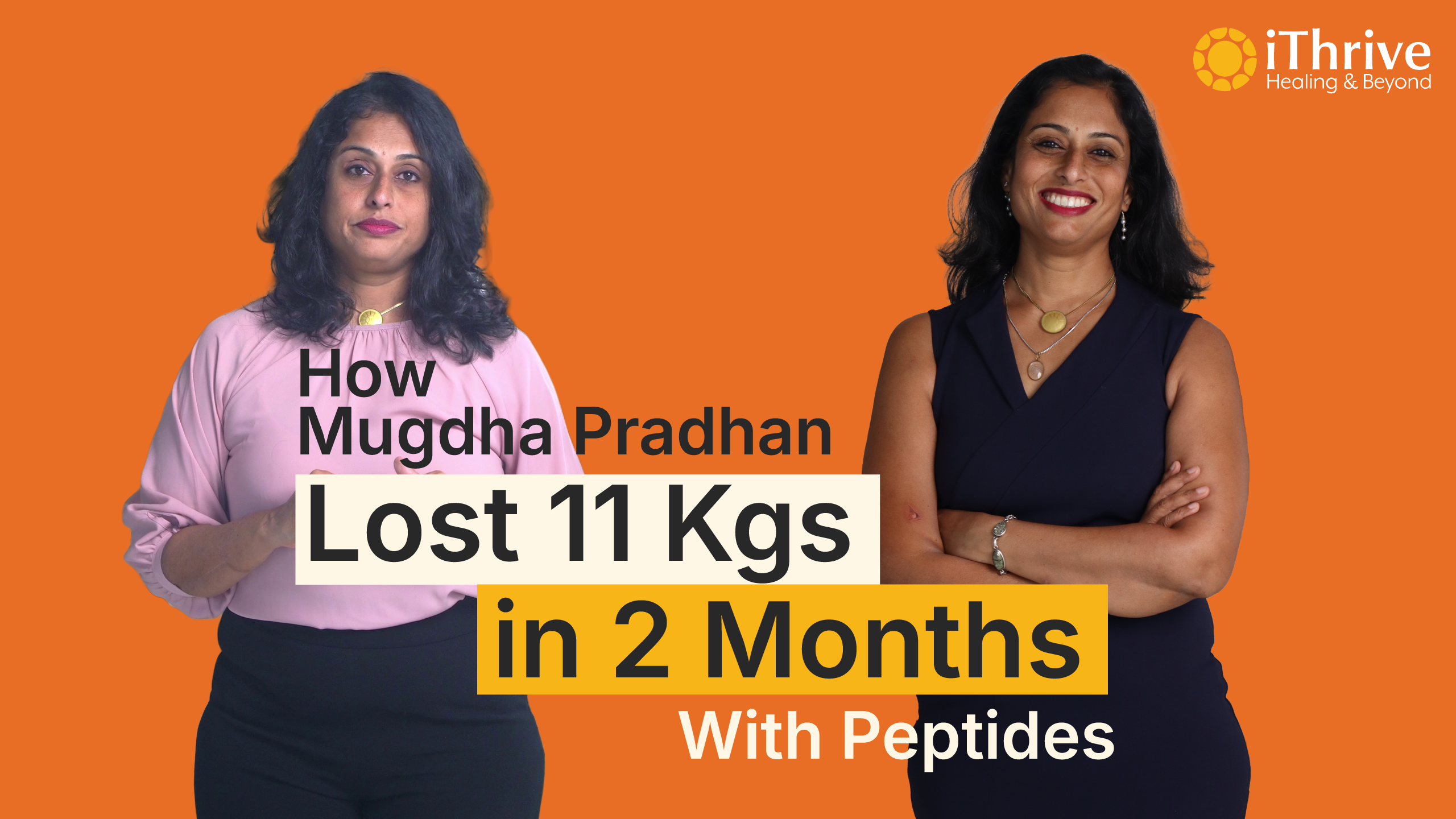You’ve probably heard a lot about diets like Keto and Paleo. Many people try them for weight loss, more energy, or better overall health. They can seem very appealing because they promise quick results and improvements in things like gut health or hormones.
But the truth is, not every diet works for everyone. Some people may feel great on Keto, while others might experience fatigue, mood changes, or other health issues. The same is true for Paleo, what works for one person might not suit someone else. If you have landed on this page, surely your question might be: Is the Keto diet or Paleo diet safe?
This blog will provide an insight into the Keto and Paleo diets, helping you understand what they are, how they work, when they can support your health, the possible risks, and how to use them safely based on functional nutrition principles.
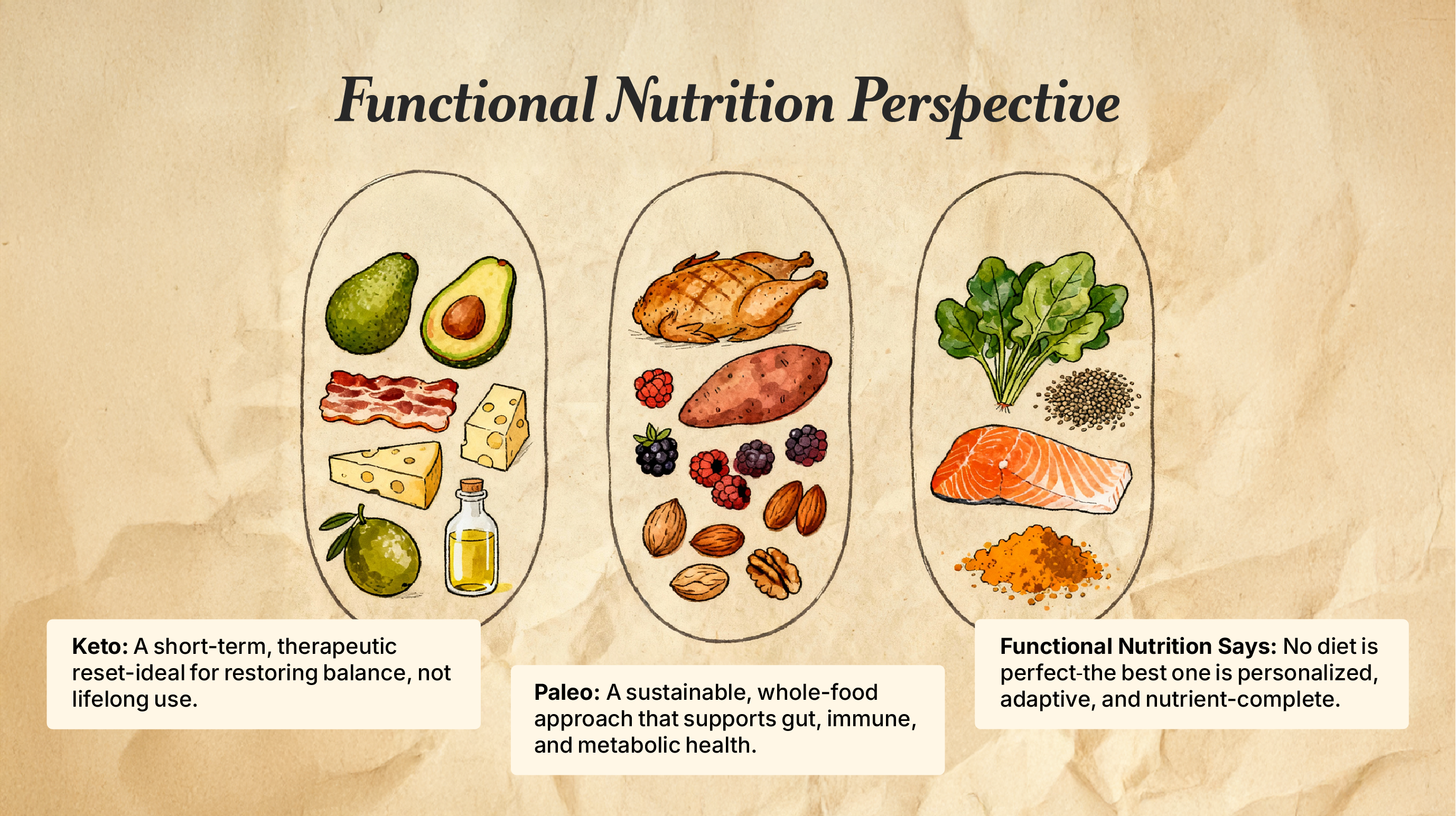
Understanding the Keto Diet
The Ketogenic (Keto) diet is a very low-carb, high-fat diet that puts your body into a state called ketosis, where it uses fat for energy instead of glucose. People following the Keto diet usually keep their carbohydrate intake very low often under 50 grams per day. They focus on eating high amounts of healthy fats like butter, ghee, coconut oil, olive oil, nuts, and seeds. Protein is moderate, coming from eggs, meat, fish, and dairy (if tolerated).
At the same time, they avoid most grains, sugar, starchy vegetables (like potatoes and corn), and fruits that are high in sugar. Essentially, it’s about replacing the energy you usually get from carbs with fat, so the body learns to burn fat for fuel instead of sugar.
When Keto Can Help
The Keto diet can be really useful, but mostly for short-term or specific medical reasons. Here’s when it can actually help:
- Epilepsy: Keto was created to treat epilepsy, and it’s still one of the most effective ways to help people with drug-resistant epilepsy.
- Brain Support: There’s research showing that a high-fat, low-carb diet can give the brain a kind of alternative fuel that is ketones. This can be helpful for conditions like Alzheimer’s and Parkinson’s. Ketones reduce oxidative stress, lower inflammation, and basically give your brain a break when it struggles to use sugar efficiently.
- PCOS (Polycystic Ovary Syndrome): As per research keto can really help with PCOS by improving insulin sensitivity, helping with weight management, and even balancing hormones. Studies show that low-carb diets are great for optimizing hormonal outcomes in PCOS. And it’s not just physical, but mental health can improve too, which is also important.
- Fatty Liver (NAFLD): Keto stabilizes blood sugar and lowers inflammation, which can help prevent or even reverse fatty liver. Obese people on a Keto diet for a few months not only lost weight but also had less fat build-up and inflammation in their liver. For those with metabolic syndrome, a Mediterranean-style Keto can be even more helpful.
- Autoimmune and Gut Issues: For some people with autoimmune conditions or gut sensitivities, reducing carbs and certain foods temporarily through Keto can give the gut a rest and ease inflammation.
- Mitochondrial Support: Keto can boost cellular energy by rising ketone levels, which help reduce harmful oxidative stress, boost antioxidant defenses, and improve the way your cells make energy.
- Weight Loss and Metabolic Flexibility: If you’re overweight, cutting carbs can kickstart fast metabolic changes. Keto can be followed safely for anywhere from a few weeks to several months, depending on the person and their goals.
Potential Drawbacks of Keto Diet
Keto isn’t perfect for everyone, and using it long-term or without guidance can cause some problems:
- Hormonal Stress: Eating very few carbs for too long can raise stress hormones like cortisol, affect thyroid hormones (T3), and mess with reproductive hormones. Basically, your body feels stressed out.
- Insulin Resistance: Surprisingly, staying low-carb for too long can actually make your body less sensitive to insulin over time.
- Thyroid Issues: Long-term Keto can lower active thyroid hormone and increase reverse T3, slowing down your metabolism.
- Kidney problems: High protein and long-term ketosis can strain your kidneys and increase the risk of kidney stones. People with kidney issues need to be extra careful while following this diet.
- Nutrient Gaps: Cutting out carbs can mean missing out on important vitamins and minerals.
- Oxalate Problems: Keto may make it harder for the body to handle oxalates, which can contribute to kidney issues.
- Fertility Concerns: Women who follow Keto for too long may experience menstrual irregularities or even amenorrhea because of hormonal changes.
- Hard to Maintain: Keto can be tough to stick with in the long run. For many people, experts suggest using it short-term for specific goals, and then moving to a more balanced approach, like a Mediterranean-style diet.
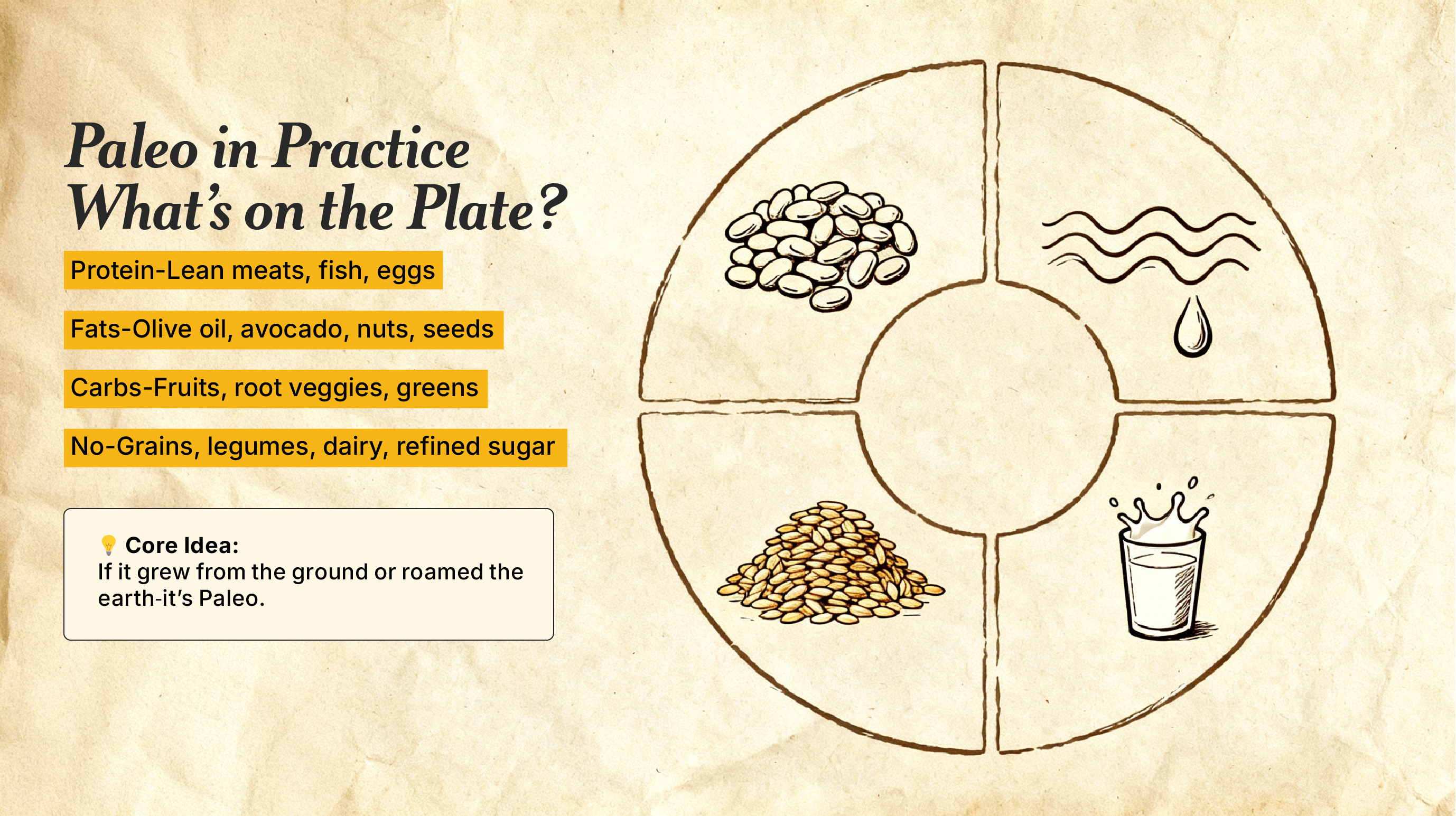
Does Functional Nutrition Support Keto Diet
Functional nutrition sees Keto mostly as a short-term, targeted tool, not a permanent diet. It can help improve metabolic health, manage conditions like PCOS, and support brain function, but only when done safely. Working with an expert ensures you get enough nutrients, cycle carbs when needed, and avoid hormonal or metabolic stress. The goal is temporary support, helping your body heal and function better, before transitioning to a more balanced, sustainable way of eating.
In other words, Keto can be a powerful tool when used intentionally and temporarily, but the ultimate aim is to help your body move toward a more balanced, sustainable way of eating afterward.
Understanding Paleo Diet
The Paleolithic, or Paleo, diet is basically about eating real, whole foods. People on this diet focus on vegetables, fruits, nuts, eggs, fish, and lean meats while avoiding grains, dairy, and processed sugars. In practice, someone following Paleo might skip bread, pasta, or milk, and instead have meals like grilled fish with veggies, omelets with greens, or a handful of nuts as a snack.
When Paleo Can Be Beneficial
- Managing PCOS:
The Paleo diet can be very helpful for people with PCOS. By focusing on whole, nutrient-dense foods like vegetables, fruits, eggs, fish, and lean meats, and minimizing sugar and processed foods, it helps manage weight, improve insulin sensitivity, and support hormone balance.
- Supporting Brain Health and Autoimmune Conditions:
Some modified versions of the Paleo diet, like the Wahls Protocol, are designed to reduce inflammation, support mitochondria (the energy centers of our cells), and protect brain health. For example:
Wahls Paleo (Level one)
Wahls Paleo Level One is a gentler version of the Paleo diet designed to reduce inflammation and support healing, especially for autoimmune or chronic conditions. It focuses on adding a lot of nutrients to your meals like 6 to 9 cups of vegetables a day, including leafy greens, colorful produce, and sulfur-rich veggies such as cabbage, onions, and mushrooms. It also includes clean protein like fish, eggs, poultry, or grass-fed meat, along with healthy fats from nuts, seeds, olives, avocado, and coconut. At the same time, it avoids gluten, dairy (except maybe ghee), refined sugar, and processed foods, and removes eggs only if you're sensitive. The goal is to nourish the body deeply without making the diet too restrictive.
Wahls Paleo (Level Two)
Level Two is a slightly stricter version of Level One. You still focus on lots of vegetables, clean protein, and healthy fats, but now you start removing more foods that may cause inflammation. This level cuts out all grains, beans, and potatoes. It also encourages adding things like fermented foods and seaweed for extra gut and mineral support. The idea is to go a little deeper in healing without making it overwhelming. People following this avoid grains and limit potatoes or beans, while including fermented foods and seaweed.
Wahls Paleo Plus (Level Three)
Level Three is the most therapeutic and is almost like a mix of Paleo and keto. It removes all grains, beans, potatoes, and limits fruit to small amounts. It also includes intermittent fasting and increases healthy fats so your body can shift into using fat for energy. This level is usually used for serious autoimmune or neurological conditions and is meant to support deep healing, brain function, and inflammation control. This is a more intensive approach that is also ketogenic. It eliminates all grains, pulses, and potatoes, limits fruit, and incorporates intermittent fasting. This version is often used for autoimmune conditions or neurological disorders like Multiple Sclerosis.
- Helping With Fatty Liver, Obesity, and Metabolic Health:
Early studies suggest that eating a Paleo-style diet like lots of vegetables and fruits, lean protein, and healthy fats can help reverse obesity, type 2 diabetes, and fatty liver disease.
- Rheumatoid Arthritis and Gut Health:
The Paleo approach also works well with elimination diets and anti-inflammatory protocols. It helps people identify foods that might trigger inflammation, like gluten, dairy, or nightshades, and supports gut healing and overall recovery.
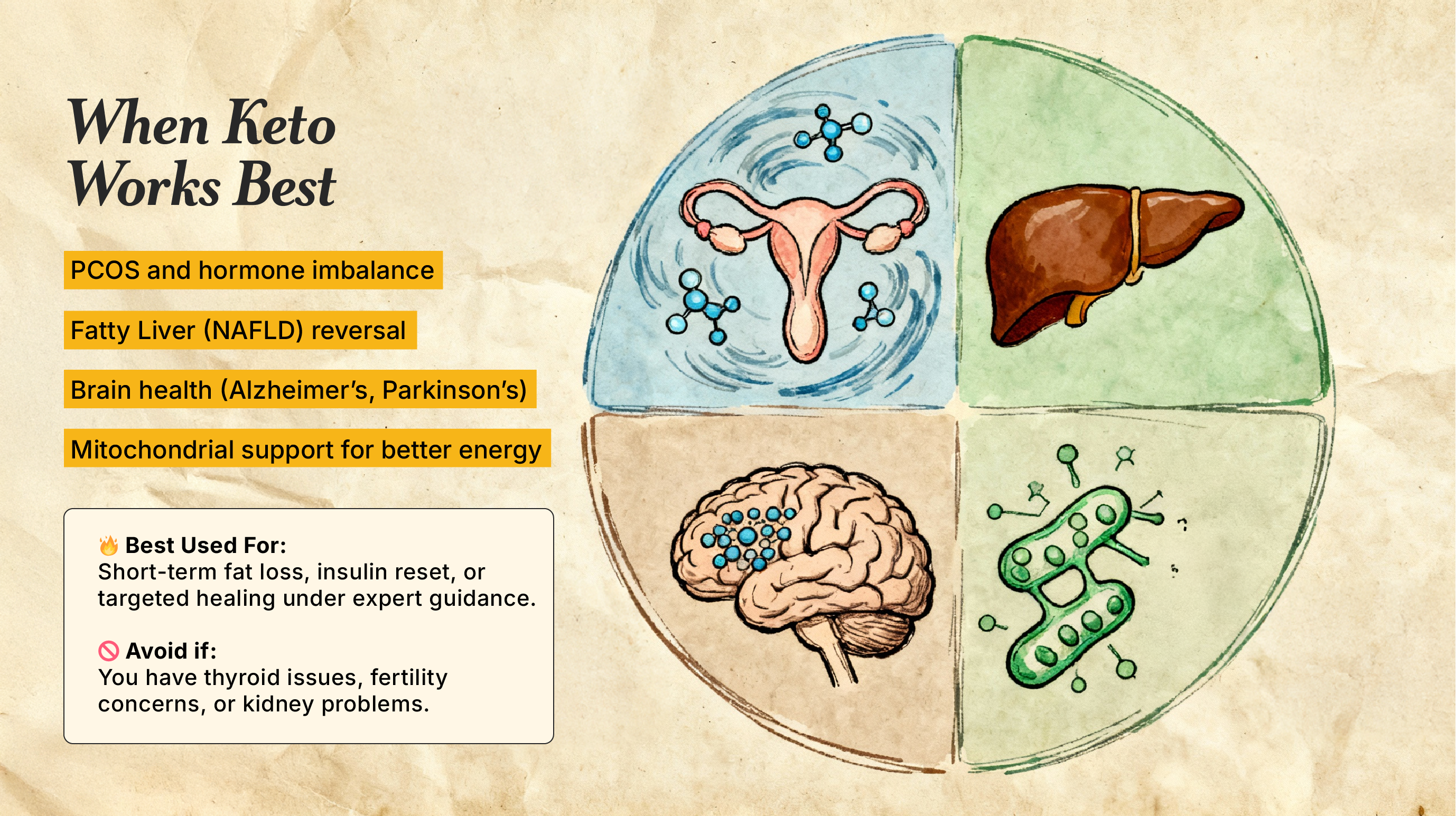
Potential Risks and Limitations
While the Paleo diet offers many benefits, it’s important to be aware of some potential drawbacks so you can follow it safely and effectively.
- Nutritional Gaps:
Since the Paleo diet eliminates grains, it can sometimes lead to missing out on key nutrients. For example, whole grains are a good source of folic acid, vitamin B1, and vitamin B6.. Cutting these out without proper planning may leave your body short on these essential nutrients, which can affect bone health, energy levels, and overall metabolic function.
- Not Always Aligned With Standard Guidelines:
Some strict versions of Paleo, such as the Wahls Elimination diet, can be very restrictive. These approaches often allow unlimited saturated fat and completely cut out entire food groups. While this can be helpful therapeutically in certain medical conditions, it doesn’t always follow standard nutrition recommendations for a balanced diet, which suggest a variety of food groups and moderate fat intake.
- Sustainability Challenges:
Following a strict Paleo plan can be challenging over the long term. Avoiding foods like grains, dairy, and processed items requires careful planning and monitoring, also it can feel restrictive in social or family settings. This may make it difficult for some people to stick to consistently, which could reduce the long-term benefits of the diet.
Does Functional Nutrition Support Paleo Diet
Functional nutrition experts view the Paleo diet as a powerful and flexible tool, rather than a strict rule everyone must follow. When used thoughtfully, it can help manage inflammation, support the immune system, and improve metabolic health. But the main thing is you should make sure the diet fits your body, your lifestyle, and your health goals. This means including enough nutrients, balancing protein, healthy fats, and carbs from vegetables and fruits, and making the diet practical and sustainable for daily life.
Subscribe to our newsletter and receive a selection of cool articles every week


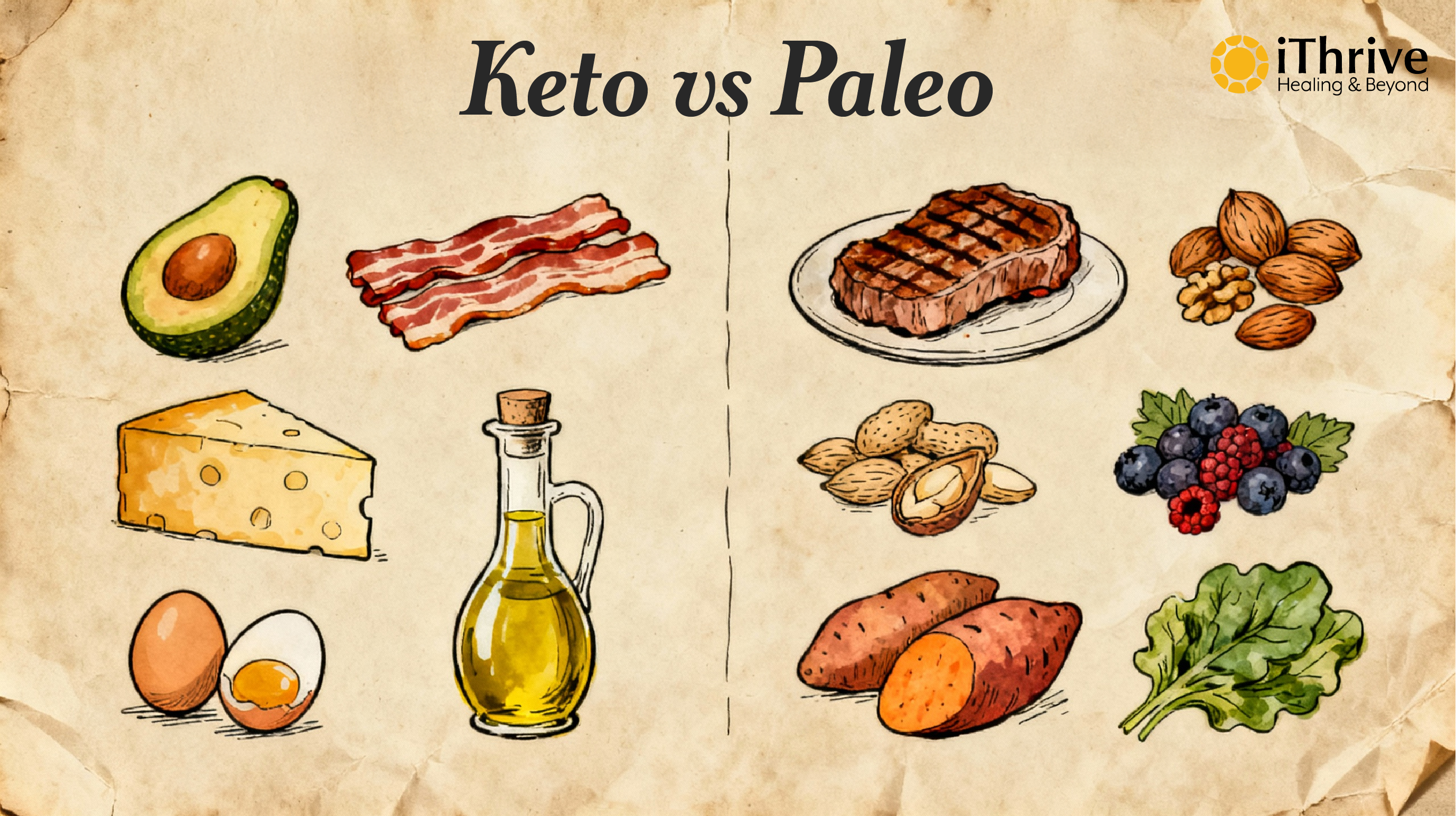


.png)


.webp)

.jpg)
.jpg)




